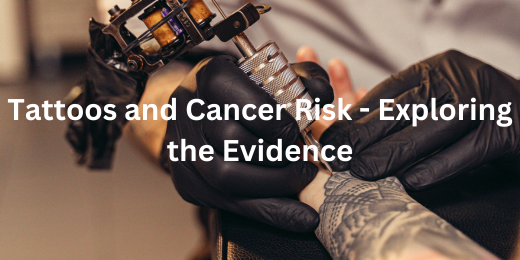
Tattoos and Cancer Risk – Exploring the Evidence
Tattoos and cancer risk
The Popularity of Tattoos
The prevalence of tattoos has surged significantly, with a remarkable 32% of the American population now adorned with at least one piece of body art. They are celebrated for their role in creative self-expression and personal storytelling. On the other hand, new research raises the possibility that tattoos and cancer risk are related. The increasing attention directed towards the potential health consequences associated with tattoos underscores the necessity for individuals to be cognizant of potential risks.
Culturally, tattoos are significant, often representing deeply personal stories or artistic creativity. Despite their widespread acceptance, it is crucial to consider the associated health risks. Studies indicate a possible link between tattoos and cancer risk, underscoring the need for caution when deciding to get inked.
While tattoos are cherished and common, the potential health risks, including tattoos and cancer risk, must be acknowledged. Awareness about tattoo health risks is essential for anyone considering body art. Understanding these risks can help individuals make informed decisions about their tattoos, balancing personal expression with health considerations.
Studies Highlighting Cancer Risks
Recent research has elucidated potential correlations between tattooing and the development of cancer. Research conducted in Sweden has indicated a statistically significant 21% increased prevalence of lymphoma among individuals with tattoos. This indicates a possible correlation between having tattoos and increased cancer risk.
Further concerns arise regarding the potential for tattoo inks to elevate skin cancer risks. Some studies suggest that the ingredients in certain inks may contribute to an increased risk of skin cancer. These concerns highlight the broader tattoo health risks associated with tattooing.
Despite these findings, more comprehensive epidemiological research is necessary to validate these claims. While the evidence points to a potential risk, additional studies are needed to fully understand the implications. A thorough examination of tattoo health risks will be crucial in forming conclusive insights about the long-term effects of tattoos on health.
Mechanisms Linking Tattoos to Cancer
Research on the possible link between tattoos and cancer risk is still underway. Tattoos and cancer risk may be linked to the ingredients in tattoo ink, which include pigments and solvents that could affect health over time.
Accumulation of these pigments in lymph nodes is a concern, as it may contribute to an increased risk of cancer. When pigments gather in lymph nodes, they might influence the development of cancerous cells. This highlights important tattoo health risks associated with tattooing.
Additionally, the interaction between tattoo ink and the immune system is not yet fully understood. The impact of these substances on immune cells requires more research to determine any potential long-term health effects. Continued investigation into these mechanisms is essential for a comprehensive understanding of tattoo health risks.
Expert Insights
Dr. Melena Fikstor, affiliated with the International Agency for Research on Cancer, explores the tattoos and cancer risk through her research. She notes that certain components in tattoo ink could pose potential health risks.
Her findings suggest that the pigments in tattoos may accumulate in lymph nodes, potentially increasing the risk of developing cancer. Dr. Fikstor’s work highlights the importance of understanding these tattoo health risks more thoroughly.
With her own experience of having several tattoos, Dr. Fikstor acknowledges that while definitive evidence is lacking, the potential health impacts are still under study. Her research calls for continued investigation into the safety of tattoo inks and their long-term effects on health.
Preventive Measures
Tattoos and cancer risk are concerns that should be addressed with preventive measures. Selecting a trustworthy and clean tattoo parlour is essential to avoiding any health hazards. Ensuring that the studio follows strict cleanliness protocols helps minimise complications.
Applying sunscreen to tattoos, especially coloured ones, is essential to protect against UV exposure. Regular use of sunscreen can reduce the likelihood of tattoos and cancer risk associated with sun damage. Adhering to proper aftercare protocols is crucial for prolonging the lifespan of tattoos and preserving the health of the tattooed skin.
Monitoring tattooed skin for any unusual changes is vital for health awareness. Early detection of changes can help address potential tattoo health risks before they become serious issues. For general health, routine examinations and attention to skin changes are advised.
Public Concerns and Reactions
Tattoos and cancer risk have sparked common worries regarding long-term health risks compared to immediate concerns such as infections. Immediate risks include the possibility of infections if proper hygiene practices are not followed during the tattooing process.
Adopting a healthy lifestyle can help mitigate some of the potential cancer risks associated with tattoos. Although tattoo health risks are still being studied, maintaining good overall health may play a role in reducing adverse effects.
Ongoing research is crucial to understand the full impact of tattoos on health. To definitively determine the relationship between tattoos and cancer risk, and to offer comprehensive guidance on potential health implications, additional research is imperative.